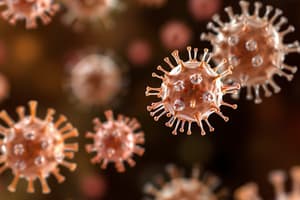Podcast
Questions and Answers
What role do antibodies play in the immune response against pathogens?
What role do antibodies play in the immune response against pathogens?
- Directly destroy pathogens through chemical reactions.
- Inhibit the growth of non-infectious agents.
- Promote phagocytosis and activate the complement system. (correct)
- Produce toxins that neutralize the effects of viruses.
Which type of immune response involves the production of antibodies by B cells?
Which type of immune response involves the production of antibodies by B cells?
- Humoral immunity (correct)
- Cellular immunity
- Innate immunity
- Passive immunity
What distinguishes active immunity from passive immunity?
What distinguishes active immunity from passive immunity?
- Active immunity is less effective compared to passive immunity in combating pathogens.
- Active immunity functions only in cellular immunity; passive immunity is part of humoral immunity.
- Active immunity provides immediate protection while passive immunity is long-lasting.
- Active immunity develops from vaccination or infection, while passive immunity involves transfer of antibodies. (correct)
During the primary immune response, what occurs when the immune system first encounters an antigen?
During the primary immune response, what occurs when the immune system first encounters an antigen?
What is the function of memory cells in the secondary immune response?
What is the function of memory cells in the secondary immune response?
What is the primary function of antibodies in neutralization?
What is the primary function of antibodies in neutralization?
How does impaired B cell function affect a person's immune system?
How does impaired B cell function affect a person's immune system?
Which mechanism of antibodies involves clumping together multiple antigens?
Which mechanism of antibodies involves clumping together multiple antigens?
What is the primary role of T cells in the immune response?
What is the primary role of T cells in the immune response?
What process occurs when antibodies cause soluble antigens to become insoluble?
What process occurs when antibodies cause soluble antigens to become insoluble?
Flashcards are hidden until you start studying
Study Notes
Role of Antibodies in Immune Protection
- Antibodies enhance the immune response by activating the complement system and promoting phagocytosis, leading to pathogen elimination.
Acquired Immunity (Adaptive Immunity)
- Acquired immunity is specific and long-lasting, developed through exposure to pathogens or vaccines.
- Highly specific; immune cells recognize unique antigens, offering tailored responses to various pathogens.
- Involves immunological memory, enabling a rapid response upon re-exposure to previously encountered antigens.
Arms of Adaptive Immunity
- Cellular Immunity: Mediated by T lymphocytes (T cells) that attack infected or abnormal cells.
- Humoral Immunity: Mediated by B lymphocytes (B cells) that produce antibodies to neutralize pathogens and toxins.
Immune Responses
- Primary Response: Initial and slower response when first encountering an antigen, with activation and proliferation of specific immune cells.
- Secondary Response: Faster and stronger response upon subsequent exposures, due to memory cells, forming the basis for vaccine-induced immunity.
Types of Acquired Immunity
- Active Immunity: Develops from exposure to antigens through infection or vaccination; results in long-term protection with memory cells.
- Passive Immunity: Transfer of pre-formed antibodies from another individual, providing immediate but temporary protection.
Impact of Impairments
- T Cells: Impaired function leads to compromised cell-mediated immunity, increasing susceptibility to intracellular pathogens and cancer.
- B Cells: Impaired function results in decreased antibody production, heightened risk of infections from extracellular pathogens.
Mechanisms of Antibody Protection
- Neutralization: Antibodies bind to and inactive harmful components, blocking their action on host cells.
- Opsonization: Antibodies mark antigens to enhance phagocytosis by immune cells, aiding in pathogen clearance.
- Agglutination: Antibodies cross-link antigens, forming clumps that are easier for phagocytes to engulf.
- Precipitation: Antibodies convert soluble antigens into insoluble complexes, facilitating their removal from the body.
Hypersensitivity Reactions
- Type I Hypersensitivity: IgE-mediated; involves mast cell activation leading to rapid allergic responses. Treatment includes antihistamines and epinephrine.
- Type III Hypersensitivity: Immune complex-mediated; can cause inflammation and tissue damage. Associated with diseases like lupus. Treatment focuses on immunosuppressants.
- Type IV Hypersensitivity: T cell-mediated; delayed response characterized by tissue damage from sensitized T cells. Commonly seen in contact dermatitis and graft rejection. Treatment includes topical steroids and avoiding triggers.
Physiological Changes Impacting Immunity
- Stress, nutritional deficiencies, immune deficiencies, cancer, and immunosuppression negatively affect immune function, leading to increased vulnerability to infections and diseases.
Studying That Suits You
Use AI to generate personalized quizzes and flashcards to suit your learning preferences.




